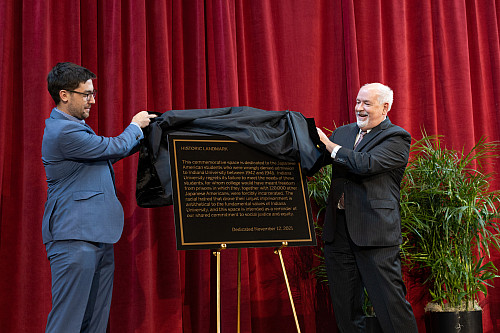New scholarship, memorial honors Japanese American students denied admission during World War II
By Jennifer Piurek
November 12, 2021

A bench and plaque near the Herman B Wells Library will create a space for reflection and remembrance of IU’s unfortunate role in denying admission to American citizens of Japanese ancestry at a time when only three options were open to them: relocation to an internment camp, service in the military, or admission to a college or university.
Applegate said he visited Manzanar Relocation Center in California several years ago. Manzanar is one of 10 camps where the U.S. government incarcerated Japanese immigrants and Japanese American citizens during World War II.
“If you were held there against your will — despite your loyalty to the United States, and far from your home, other family members, jobs and businesses, and your community — then Manzanar is isolated, desolate and, I have to believe, terrifying,” Applegate said. “By denying admission to these individuals, IU made itself complicit in an egregious denial of basic human rights based solely on race and ethnicity. Indiana University deeply and unreservedly regrets these actions.”
The memorial is one of several actions the university has taken since February 2020, when alumnus Eric Langowski, a descendant of Japanese American internees, and associate professor Ellen Wu wrote a letter to then IU President Michael A. McRobbie, formally urging the university to redress the injustice of the ban.
Working with university historian and professor James Capshew, Langowski had researched this period and published his findings in the Indiana Magazine of History in 2019.
Then-Provost Lauren Robel appointed a Japanese American Ban Advisory Group — chaired by Karen Inouye, the Ruth N. Halls Professor of History and chair of the Department of American Studies in the College of Arts and Sciences — to educate the community about this period in our nation’s history. In addition to Inouye and Langowski, committee members included:
- Nick Cullather, professor of history and international studies in the College of Arts and Sciences.
- James Nakagawa, the Ruth N. Halls Professor of Photography.
- Ashlyn Nelson, associate professor in the O’Neill School of Public and Environmental Affairs.
- Dina Okamoto, professor of sociology in the College of Arts and Sciences and director of the Center for Research on Race and Ethnicity in Society.
- Scott O’Bryan, associate professor of history and of East Asian languages and cultures in the College of Arts and Sciences.
- Lisa Doi, graduate student of American studies.
Inouye is currently teaching a course on internment through film, history, art and literature. A panel discussion scheduled for the National Day of Remembrance in February will also bring together scholars to explore the impact of anti-Japanese policies during World War II and more broadly.
Masuji Miyakawa Scholarship
The Japanese American Ban Advisory Group worked with IU Foundation and the Office of Enrollment Management to establish a scholarship benefiting underrepresented students who face structural barriers to higher education.
Starting with the 2022-23 academic year, IU will institute the Masuji Miyakawa Scholarship, named for IU’s first Japanese American graduate. In its first year, the scholarship will be offered to three students; three more will be added each consecutive year until 12 students hold the scholarship at a time, in honor of the 12 who were denied admission during the ban.
For each year of study, students will receive $5,000, totaling $20,000 per student over the course of their undergraduate careers.
“It is our sincere hope that these scholarships, together with the memorial that we are dedicating today — by reminding us of the times when we have fallen short in living up to our aspirations — will inspire us to renew our commitment to a community that is truly diverse, equitable and inclusive,” Applegate said.
After comments from Applegate, Langowski and Melanie Castillo-Cullater, director of the Asian Culture Center, Applegate and Langowski unveiled a replica of the plaque that will be showcased on campus when it is completed.
The text reads:
“This commemorative space is dedicated to the Japanese American students who were wrongly denied admission to Indiana University between 1942 and 1945. Indiana University regrets its failure to meet the needs of these students, for whom college would have meant freedom from prisons in which they, together with 120,000 other Japanese Americans, were forcibly incarcerated. The racial hatred that drove their unjust imprisonment is antithetical to the fundamental values of Indiana University, and this space is intended as a reminder of our shared commitment to social justice and equity.”
Jennifer Piurek is director of communications and special projects in the Office of the Provost.